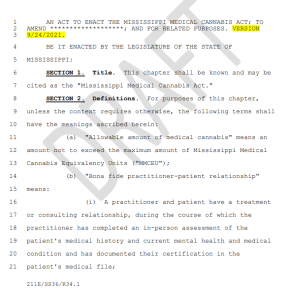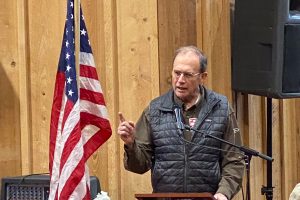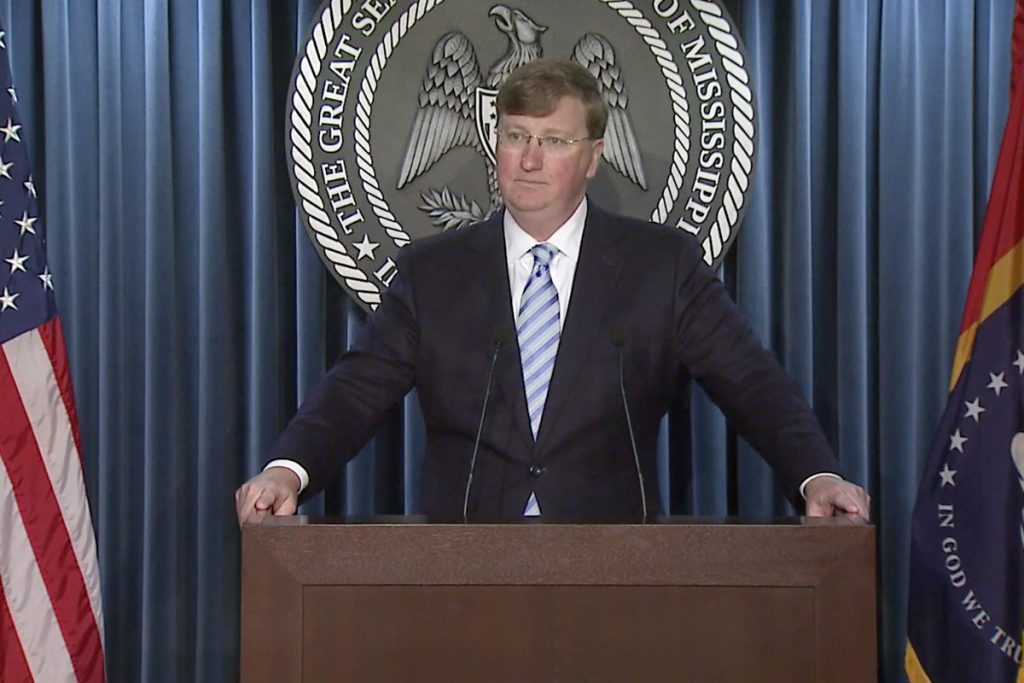Gov. Tate Reeves is not quite ready to call a special session to establish a medical marijuana program for Mississippi, but a session is likely soon. “There is no update on exactly when the special session is going to occur, but I do anticipate that we’re going to have one sooner, rather than later,” the governor said today at a press event.
Reeves acknowledged that the Legislature had a few remaining issues to work out, primarily the funding structure for the program, the management costs of which will be spread out across three government agencies. Reeves says he expects a proposal for an appropriations bill that should clarify the funding structure of the medical marijuana program.

But Mississippi’s legislative leadership appears to have worked out the core details of a medical marijuana program, meeting the precondition for a special session to enact the program and achieve the primary goal of Initiative 65, the cannabis constitutional amendment that died in the Mississippi Supreme Court earlier in the year. Legislative leadership, beginning with House Speaker Philip Gunn, explained late last week that House and Senate negotiators had agreed upon the terms of a draft.
On Friday, Lt. Gov. Delbert Hosemann confirmed that a draft was complete and “ready for consideration,” expanding on the details of the cannabis bill in a press release. The Mississippi Free Press acquired the full draft bill, a sprawling document, 144 pages in total. But as of yet, Gov. Tate Reeves has been quiet on the prospect of a special session to adopt the bill.
If the draft bill becomes law, whether through a special session or not, medical marijuana will be available for the treatment of all conditions included in Initiative 65, “as well as hepatitis, Alzheimer’s disease, and spastic quadriplegia.”
At a Tuesday hearing of the Mississippi Black Legislative Caucus, State Health Officer Thomas Dobbs acknowledged that the specific conditions were relatively insignificant. The bill allows doctors extensive latitude to allow marijuana certification for any “chronic, terminal or debilitating disease or medical condition, or its treatment, that produces one or more of the following: cachexia or wasting syndrome, chronic pain, severe or intractable nausea, seizures, or severe and persistent muscle spasms.”
Possible Restrictions Limited
The draft would empower physicians, nurse practitioners and optometrists to certify patient use of cannabis, but requires a “bona fide practitioner-patient relationship” in order for certification. A bona fide relationship requires the practitioner to conduct a full review of the patient’s medical history, as part of an ongoing medical relationship, including follow-up visits.
Hosemann’s press statement suggests that the draft “(allows) local governments to exercise reasonable zoning laws related to the location of medical cannabis facilities.” Concern over municipal zoning authority was key to the legal challenge that undid Initiative 65.
In truth, there is little in the bill regarding zoning at all. The draft bill does require operators of potential cannabis facilities—meaning grow operations, processing facilities or dispensaries—to be properly zoned according to local law. “If the municipality or county where the proposed medical cannabis establishment would be located has enacted zoning restrictions, a sworn statement certifying that the proposed medical cannabis establishment is in compliance with the restrictions,” the bill states.
But the bill would establish limits to what those restrictions may be. “No municipality or county may prohibit dispensaries either expressly or through the enactment of ordinances or regulations that make their operation impracticable in the jurisdiction,” it states.

Hosemann’s reading of the draft may conclude that municipalities will maintain zoning authority if the nascent bill becomes law, but other stipulations in the draft assert that popular support for medical marijuana can override hesitant local governments.
Mississippi Today’s Geoff Pender reported that municipalities and counties could opt to reject cultivation facilities and dispensaries during a 90-day period following the draft bill’s passage. But a relatively small number of voters could trigger a referendum that would override local government rejection of cannabis facilities.
“Citizens (can) overrule such a decision through a referendum process,” Hosemann’s Deputy chief of staff, Leah Rupp Smith explained in the press statement. And once a region has opted in to the medical-cannabis program, there is no going back, a promise to investors and business owners that no momentary swell of reaction would upend their dispensary or cultivation facilities years down the line.
Taxation ‘Absolutely Ridiculous’
In one sense, much of Initiative 65 exists in the confines of the draft bill. If passed, it would establish a full regulatory system for a medical-cannabis program in Mississippi, inviting Mississippians, as well as out-of-state investors and companies, to build a legal cannabis industry in the state.
But advocates for maximal availability and affordability of medical cannabis have some serious issues with the bill.
Zack Wilson, a cannabis entrepreneur and vice president of We Are The 74, an advocacy group established after the Mississippi Supreme Court decision, addressed the medical-cannabis draft bill with the Mississippi Free Press in a Monday interview. One of Wilson’s big concerns with the current draft is the additional taxation. The bill would establish excise taxes for both marijuana flower and marijuana trim—parts of the plant other than the flower—at $15 an ounce.
“The taxation is absolutely ridiculous,” Wilson said. “A 7% sales tax is understandable. We voted for that in 65. But with this excise tax, they’re not understanding that what that will do to the final price to the patient in Mississippi is astronomical.” Marijuana trim is primarily processed and turned into concentrates that can act as potent pain and nausea relievers.
“It takes 20 to 25 pounds of trim to make a pound of concentrate,” Wilson said, “Now with just the taxes, it’s going to be well over a hundred dollars a gram for concentrate,” an amount Wilson says will make THC extract prohibitively expensive for anyone but the wealthiest Mississippians.

Wilson’s concerns involve cost to the consumer as well as cost to the producer—specifically, small Mississippi-based companies managing smaller grow operations. The draft bill offers two categories for “micro-cultivators” maxing out at less than 2,000 square feet of canopy. Such operations will require $6,000 in start-up licensing fees and $3,500 each year after that.
Any growspace beyond 2,000 square feet will demand $20,000 in start-up licensing fees, and $15,000 annually. Wilson wants businesses with 100% Mississippi-based ownership to have consistently lower fees at all levels of cultivation, encouraging residents to start grow operations that can compete with out-of-state corporations.
Mississippi Sen. Chris McDaniel, R-Ellisville, shared similar concerns in an interview with the Mississippi Free Press. “My position would be that we adopt, almost entirely, the language that was passed (in Initiative 65.) … What you’ll find in this bill is quite a few taxes, and quite a few regulations,” McDaniel said. “The concern that I’ve got is that if you overregulate this bill, you may not have enough product to the marketplace, or if you do, that this product will be incredibly expensive.”
Regulators Wary of Role
Regulation of the medical-cannabis program has been a particularly sore spot for the state agencies tasked with the job. The draft requires coordination between three Mississippi agencies, the Departments of Health, Agriculture and Commerce, and Revenue.
Mississippi State Department of Health leadership loudly fought back against the swell of support for Initiative 65. State Health Officer Thomas Dobbs urged Mississippians to vote no against the constitutional amendment when it was on the ballot in 2020, suggesting that it would overburden the state’s health agency at a critical time.
“Initiative 65 would inappropriately require us to divert already-limited resources for the benefit of an incredibly complicated industry,” Dobbs wrote in an opinion piece for the Mississippi State Medical Association.
But perhaps the most dramatic response to the proposed medical marijuana bill has come from Agriculture Commissioner Andy Gipson. The Daily Journal obtained a letter in which Gipson lamented that “depending on the wording of the bill (a draft of which I have yet to be provided) … this proposal (would) require me to violate my oath of office.”
Gipson has repeatedly suggested that he may challenge any version of a medical-cannabis program that involves his agency, potentially setting up yet another legal battle over the long-anticipated program.
The draft bill explicitly states that “the (Mississippi Department of Agriculture and Commerce) shall be responsible for the licensing, inspection and oversight of cannabis cultivation facilities, cannabis processing facilities, cannabis transportation entities and cannabis disposal entities,” although the bill does provide the department with the option to contract for some of these services.
At a Tuesday press event, Gipson railed against the bill and what it would require him to do as agriculture commissioner. “It’s not what my oath of office required, and it’s not what the people in Mississippi elected me to do … to be the marijuana kingpin of the state of Mississippi,” he stated.
At a Tuesday Mississippi Legislative Black Caucus hearing on the medical cannabis bill, State Health Officer Thomas Dobbs explained that the Mississippi State Department of Health’s work following the Initiative 65 vote has left it in a strong position to adopt its new regulatory role under the draft bill.
Dobbs was markedly more positive than Gipson about MSDH’s role in the proposed medical-cannabis system, although he took issue with some of the available methods of delivery. “We will perpetually try to get people not to smoke stuff, because it’s bad for you,” Dobbs said.
“Normally, in the sort of licensing scheme, we pay for the program through fees … or state general fund appropriation.” When his agency is funded through general fund appropriation, Dobbs warned, “it ends up cutting care for pregnant women and babies.” Dobbs asked legislators to ensure that the funding of the new medical-cannabis program does not strip funding from key elements of MSDH’s mission.










